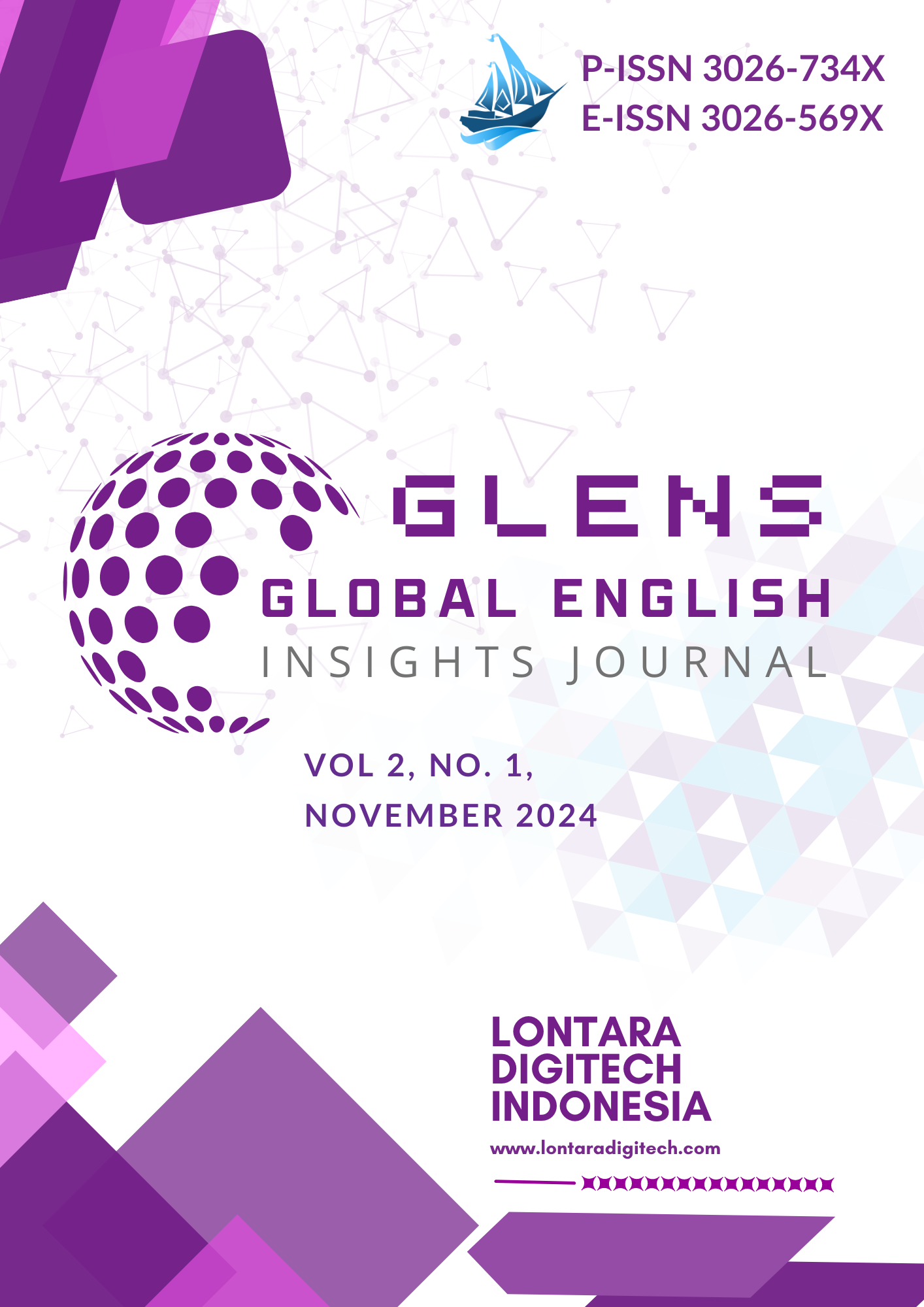Exploring EFL Students' Creativity and Engagement with AI Chatbot in Web-Based English Course
DOI:
https://doi.org/10.61220/glens.v2i1.591Keywords:
AI Chatbot, Creativity, EFL Students, Engagement, Web-based LearningAbstract
This research explores the role of AI-based chatbot tools in promoting creativity and engagement among English as a Foreign Language (EFL) students in web-based English material development course. A qualitative research design was employed, involving in-depth interviews and observation checklists. The research was conducted at the English Education Faculty in Parangtambung of Universitas Negeri Makassar, with data collection spanning from May 12, 2024, to June 9, 2024. Participants included five undergraduate students from the 6th semester based on their familiarity with AI chatbots. The subjects of this research were undergraduate students enrolled in the English web-based material development course. Specifically, five students with prior experience or familiarity with AI chatbots were chosen to provide detailed insights through interviews and observations. The findings indicate that AI chatbots significantly encourage creativity among EFL students by providing a safe space for language experimentation and immediate feedback. Students reported increased engagement and enjoyment in their learning process. The research concludes that while AI chatbots can effectively foster creativity and engagement, careful integration and continuous monitoring are necessary to maximize their educational benefits.
References
Belda-Medina, J., & Calvo-Ferrer, J. R. (2022). Using Chatbots as AI Conversational Partners in Language Learning. In Applied Sciences (Vol. 12, Issue 17). https://doi.org/10.3390/app12178427
Ebadi, S., & Amini, A. (2024). Examining the roles of social presence and human-likeness on Iranian EFL learners’ motivation using artificial intelligence technology: a case of CSIEC chatbot. Interactive Learning Environments, 32(2), 655–673. https://doi.org/10.1080/10494820.2022.2096638
Fathi, J., Rahimi, M., & Derakhshan, A. (2024). Improving EFL learners’ speaking skills and willingness to communicate via artificial intelligence-mediated interactions. System, 121, 103254. https://doi.org/https://doi.org/10.1016/j.system.2024.103254
Isma, A., Lestari, I. W., Rohimajaya, N. A., Hardiyanto, A., Susanti, E., Meisarah, F., Novia, S., Kuning, D. S., Hamer, W., & Rasmin, L. O. (2024). Digital Tools for English Language Learning: A Comprehensive Guide for EFL Educators (1st ed.). Yayasan Kita Menulis.
Jia, F., Sun, D., Ma, Q., & Looi, C.-K. (2022). Developing an AI-Based Learning System for L2 Learners’ Authentic and Ubiquitous Learning in English Language. In Sustainability (Vol. 14, Issue 23). https://doi.org/10.3390/su142315527
Kolb, D. A. (2014). Experiential learning: Experience as the source of learning and development. FT press.
Lewohl, J. M. (2023). Exploring student perceptions and use of face-to-face classes, technology-enhanced active learning, and online resources. International Journal of Educational Technology in Higher Education, 20(1), 48. https://doi.org/10.1186/s41239-023-00416-3
Lin, C.-J., & Mubarok, H. (2021). Learning Analytics for Investigating the Mind Map-Guided AI Chatbot Approach in an EFL Flipped Speaking Classroom. Educational Technology & Society, 24(4), 16–35. https://www.jstor.org/stable/48629242
Meade, J. A., & Parthasarathy, K. (2024). Does Student Engagement Impact Learning Differently in Face-to-Face and Virtual Accounting Classes? Issues in Accounting Education, 39(2), 71–83. https://doi.org/10.2308/ISSUES-2023-009
Mohamed, A. M. (2024). Exploring the potential of an AI-based Chatbot (ChatGPT) in enhancing English as a Foreign Language (EFL) teaching: perceptions of EFL Faculty Members. Education and Information Technologies, 29(3), 3195–3217. https://doi.org/10.1007/s10639-023-11917-z
Vygotsky, L. S. (1978). Mind in society: Development of higher psychological processes. Harvard University Press.
Yuan, L., & Liu, X. (2025). The effect of artificial intelligence tools on EFL learners’ engagement, enjoyment, and motivation. Computers in Human Behavior, 162, 108474. https://doi.org/https://doi.org/10.1016/j.chb.2024.108474
Downloads
Published
Citation
Issue
Section
License
Copyright (c) 2024 Mushaddiq Mushaddiq, Nurdin Noni, Abdullah Abdullah, Muhammad Tahir (Author)

This work is licensed under a Creative Commons Attribution-ShareAlike 4.0 International License.



















 Email: journalglens@gmail.com
Email: journalglens@gmail.com
